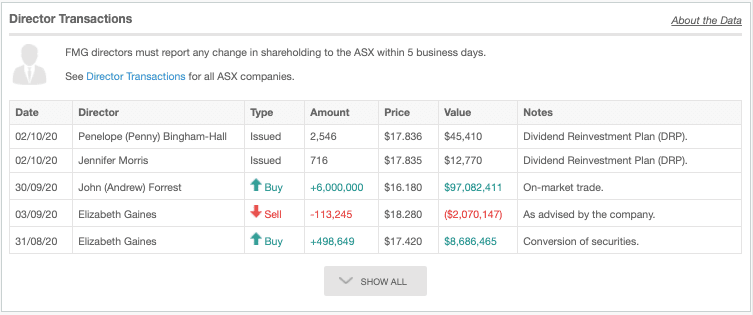A question that is asked often – is it a signal for investors to act upon, if company management buys or sells their shares?
It’s a phenomenon that we see across markets, investors reacting to Director trading activity.
Many investors often ‘follow the money’, getting excited and buying when Directors themselves buy shares, and then selling when Directors sell. This is because they assume the Directors have early knowledge of things about to crumble in the company.
We track Director share transactions as an additional factor in our screening and research process, but not to simply ‘follow the money’.
There are ASX regulations that govern Director trading, and the context is an important factor in using the information as investors. There are also cases where Director trading makes no significant difference to the share price in the long term.
Let’s take a deeper look at Director trading activity. We break things down and give you some insights from what we’ve learned and experienced.
The rules and tracking Director activity
Director trading is sometimes called ‘Insider Activity’. Insider Activity is legal and should not be confused with ‘Insider Trading’ which is illegal, i.e. when employees or management who trade based on material information not available to the public or share this information in confidence for them to trade.
Insider Activity is regulated by ASX / ASIC, which require any changes in Director’s shareholdings to be made public within 5 days via notices labelled Appendix 3Y. This is based on the ASX s. 205G of the Corporations Act 2001. ASIC actively monitors trading for misconduct, including market manipulation and insider trading.
Sale notices are typically accompanied by a written notice that states the reason for the sale.
Failure to comply with the above is a $1,700 fine, 3 month jail time or both.
All Director activity notices are publicly available along with the usual announcements in a typical broker platform or on the ASX website.
It is cumbersome to open multiple PDF announcements to look up the multiple Director trades and compare it with other instances in the past.
Some brokers have this information available as a summary, however it is not often up-to-date.
A useful website that lists Director trades for each ASX company is MarketIndex.
As an example, here is what Fortescue Metals Group’s recent Director transactions look like on MarketIndex:

Members can read on to learn about:
- Reasons Directors buy and sell
- Analysis of published research and studies on Director trading
- What can be learnt from Directors trading activity?
